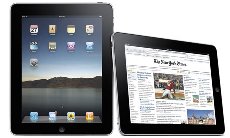Apple iPad Predicted To Beat Off Tablet Rivals

Apple is set to enjoy at least a few years of domination with its iPad tablet, despite the growing number of alternative devices
Research firm iSuppli has announced in a new report that Apple is to retain a commanding presence with its iPad tablet, at least through to 2012.
While tablet devices are expected to arrive in force this holiday season, from among the likes of Hewlett-Packard, Lenovo and even Research In Motion, among others, Apple’s iPad won’t face a “viable competitor” until 2011 the firm said, and even then it will continue to dominate.
In 2010, iSuppli expects the iPad to account for 74.1 percent of global tablet shipments, with the remaining portion going to “a mix of older PC-type tablet products and competitive slates.” In 2011, as the competition begins seriously filling out, iSuppli still expects Apple to command 70.4 percent of the market, and nearly two-thirds market share through 2012.
Short Term Domination
“Although the iPad has been on the market for only a few months, powerful interests throughout the technology business are devoting enormous resources to challenge and topple Apple’s domination in this fast-growing marketplace,” Rhoda Alexander, iSuppli director of monitor research, said in a statement.
“However, if recent history is any lesson, it will take some time for these companies to get their products to market, longer for them offer necessary software support and infrastructure, and an even lengthier period to begin to rival the overall user experience Apple is able to deliver.”
Need proof? Just remember the iPhone, states the firm. After the smartphone’s 2007 release, a number of hopeful iPhone-killers launched, but it has taken three years for Apple’s competitors to come up with a small handful of devices – the Motorola Droid and HTC Evo 4G come to mind – that can truly hold their own against the iPhone.
No Serious Competitors
At present, while a number of tablet devices are set to launch – running Windows 7, Android and WebOS – iSuppli believes that none of these are ready to be serious competitors to the iPad.
 “Companies are quickly developing products that match or exceed some of the surface hardware specifications of the Apple iPad. But it’s still unlikely that any of the competitors will be able to equal the overall performance experience of the iPad,” said Alexander. “Apple’s complete integration of hardware, software, operating system and applications is a major piece of what makes the device a standout. And on that basis – an integrated hardware/software design – we don’t see anything in the marketplace at present that seems likely to rival what Apple is offering in tablets today.”
“Companies are quickly developing products that match or exceed some of the surface hardware specifications of the Apple iPad. But it’s still unlikely that any of the competitors will be able to equal the overall performance experience of the iPad,” said Alexander. “Apple’s complete integration of hardware, software, operating system and applications is a major piece of what makes the device a standout. And on that basis – an integrated hardware/software design – we don’t see anything in the marketplace at present that seems likely to rival what Apple is offering in tablets today.”
Still another coup for Apple is the optimised appearance of applications being designed specifically for the iPad. “Developers designing applications to work across the broader base of new offerings from the various competitors are facing a mix of pixel densities, screen sizes and touch technologies,” Alexander added.
Tablet Contenders
RIM recently purchased the domain name BlackPad.com, giving rise to rumours that this will be the name of its tablet – which some expect will be introduced in November. HP has confirmed that it has WebOS- and Windows 7-based tablets in development – though iSuppli analysts believe these are unlikely to appear before 2011 – and Lenovo plans to launch an Android-running tablet before year’s end. Linking it to its LePhone, Lenovo has named the tablet LePad.
Another smartphone-tablet connection will come from Samsung, which has launched several Galaxy S smartphones and teasing clips of its Android-running Galaxy Tab tablet.
Verizon and Google have also announced that they’re working on a tablet, and iSuppli reports that rumors have Google releasing a Chrome OS-based tablet 26 November. However, citing sources that say Chrome OS doesn’t offer support for a touch display, iSuppli finds this unlikely.
“More than likely,” states the report, “Google will take an interim step up to the smart book market before jumping into the tablet fray with the Chrome OS.”